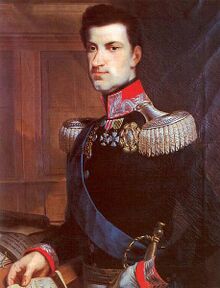Andreu of Castria
| King Andreu | |||||
|---|---|---|---|---|---|
| King of Castria (more...) | |||||
 Andreu at the time of his coronation | |||||
| Reign | 3 January 1828 - 23 July 1842 | ||||
| Coronation | 14 March 1828 | ||||
| Predecessor | King Nuño | ||||
| Successor | King James II | ||||
| Born | Error: Need valid birth date: year, month, day St Adam's Royal Palace, Candillo | ||||
| Issue | {{plainlist }} | ||||
| |||||
| Father | Nuño, King of Castria | ||||
| Mother | Maria Calcena, Queen Consort of Castria | ||||
| Religion | Apostolic Perendism | ||||
Andreu (27 April 1801 - 18 October 1860) was King of Castria from 1828 until his abdication in 1842. He was the last King of the House of Calcena that had ruled Castria since the accession of Peter I in 1530. He was the only child of King Nuño and Queen Consort Maria, however throughout his life rumours abounded as to his true parentage, on account of him being the only child produced by the couple and Maria's alleged promiscuity.
His early reign was filled with the War of Castrian Succession, in which he fought against his cousin, Prince James Laskaris of Savolia, and his allies. Victory in the war cemented Andreu's reign as King of Castria, however this proved to be his undoing as he supported reforms that reverted power from the General Council back to the Monarch and the Apostolic Church. By the beginning of the 1840s, Andreu was becoming increasingly unpopular and eventually ousted following the Jamesist Crisis, where he abdicated in favour of his cousin, James Laskaris, who became James II. Traditional Castrian historians generally vilify Andreu in their portrayals of him, typically as a power-hungry and ineffective ruler who struggled to understand the wars he sent his soldiers to die , in. However, more modern assessments of his tend have been kinder, recognising his upbringing that left him reliant of Church advisers who were equally unsuited to the task.
Following his abdication, Andreu fled Castria to [NATION]] for safety, followed by his wife and children. There, he became known as both a charming and social man, however his overindulgent living also earned him the scorn of the people, tarnishing both his reputation, but also that of the Castrian Monarchy's reputation. Bank troubles due to this irresponsible spending saw Andreu receive an allowance from the Castrian Crown in exchange for numerous works of arts he had acquired, and his dropping of the Castrian royal title, instead being created 'Duke of Santa Pal' for the rest of his life, however he was known to be embittered by this and refused to acknowledge this in public. He infamously divorced his wife in 1853, an act that led him essentially excluded from high society due to its scandalous connotations. Having spent the 1850s both partying and drinking heavily, it eventually took its toll on him, leading to his death in 1860 from complications of the liver.